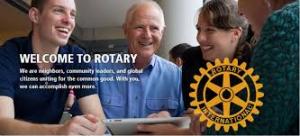Debbie Hodge, will speak on 8th July about Mercy Ships - Chat @ 18.45 Meet @ 19.00
Thu, Jul 8th 2021 at 7:00 pm - 9:00 pm
Debbie Hodge, will speak on 8th July about Mercy Ships - Chat @ 18.45 Meet @ 19.00
Debbie Hodge, will speak on 8th July about Mercy Ships - Chat @ 18.45 Meet @ 19.00
MERCY SHIPS
The health statistics for countries on the west coast of Africa are shocking. In Sierra Leone, for example, unemployment is around 80%; one in five children do not survive beyond five years; one in eight women die in childbirth; there are 26,00 deaths from preventable cause every year.
On Thursday, Rotarian Debbie Hodge, formerly a President of Rotary Great Britain and Ireland and a previous District Governor with a background in nursing, spoke about the contribution Mercy Ships has made to address these issues since its establishment in 1978.
The vision of the founder of Mercy Ships, Don Stevens, was to create a partnership with countries where need was greatest. His aims were threefold: to reduce a surgical backlog in these countries; to mentor and train local healthcare workers; and to improve local facilities. Given that 50% of the world’s population live within 100 miles of a port city, he hit upon the idea of using a ship that could berth in a local port where clean water, electricity, and medical facilities were lacking. The current ship, African Mercy, was modified to provide a range of facilities, particularly for surgical, ophthalmic, and dental procedures, as well as giving accommodation for the medical and support staff. In its 43 years, Mercy Ships have worked in more than 56 nations, providing services worth over £1.2 billion that have helped more than 2.8 million people. In a recent visit to Senegal, volunteers provided 1,407 life-changing surgeries, 5,591 dental procedures, restored sight to 535, and trained 1,286 healthcare professionals.
Recognising that a larger ship than the African Mercy would greatly enhance the work of Mercy Ships, a fund was created to which Rotary donated $1.125 million. The success of this massive fund-raising effort resulted in the commissioning of a purpose-built ship, Global Mercy, built in China, which has recently passed its sea trials. Its greatly enhanced facilities will increase the number of operations that can be completed in a year from 8,500 to 20,000.
In thanking Debbie for an excellent talk, Graham Russell said that she had reminded us that, caught up in our own problems, it was all to easy to overlook needs elsewhere in the world.


.jpg)







